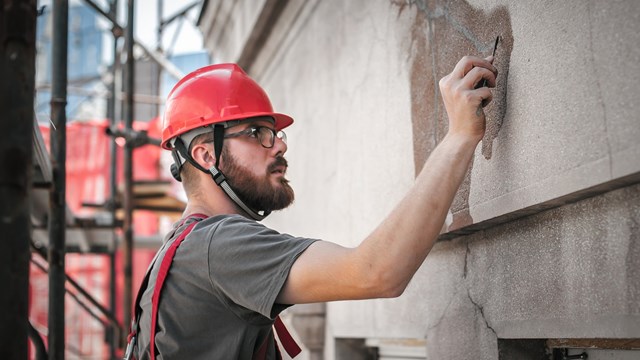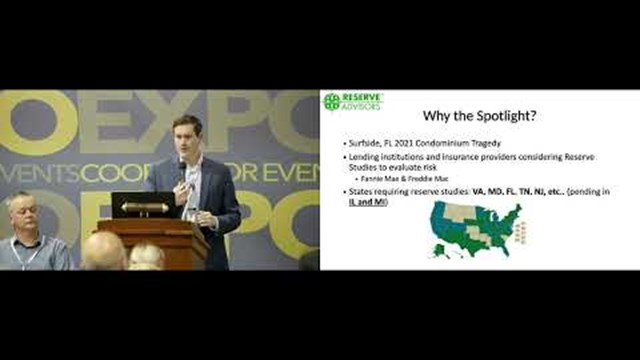
The experience of co-op and condo board members can often feel like a juggling act. There are varied interests in the community that want different things. There's legal counsel, financial advisers, and managers who try to offer the best professional advice they can, and they may not always line up. It's easy to feel like the life of a board member or trustee consists of mostly just putting out fires, and never getting ahead to the important things. But some boards may not realize that many of those fires might have been preventable in the first place had board members made the smart investments, and took the time to plan.
Just as an individual or couple can have a bank account or into which they can tap into in the event of an emergency, co-ops, condos and HOAs need a reserve fund for planned, as well as unplanned, expenses. Whether a major repair like a new boiler or roof, or something completely devastating like a blizzard that shuts down Lakeshore Drive, reserve funds can offer a great deal of relief and security.
Financial planners and accountants all agree on the importance of a reserve fund. But all reserve plans are not created equal. Careful, competent, professional management is the key. If the rainy day fund can't foot the bill for an unforeseen emergency, boards could find themselves in a tough spot.
Reserve Study Needed
Community association professionals say there is no magic formula for what makes the smartest reserve strategy for an association, although there are general guidelines.
To begin with, buildings need to have a reserve study, which is typically done by an engineer, architect, or reserve specialist. According to Michelle Baldry, PE, RS, PRA, a regional director of client services for Milwaukee-based Reserve Advisors, the study is usually done in two parts. A physical study identifies all common area components, assesses the conditions of the components and equipment, estimates the remaining life of these components and estimates their replacement cost. The financial analysis examines the status of current reserves, maps out a funding plan and identifies funding goals. A study will generally take a 30-year outlook, since components like roofs may have life spans in that range.
The reserve study is a multifaceted tool used to predict the cost of each common property component and the year the component will require maintenance and/or replacement. A reserve study recommends annual reserve contributions that balance the expenditures. As a result, the property is prepared for capital improvement and maintenance projects.
“Roofs, decks, balconies, interior finishes, pools, pavement, playgrounds—those are all standard items,” she says. “But no two properties are the same, so it’s really important to get out to the site and see what the association maintains. The way we determine if it’s a reserve component is generally based on cost; a rule of thumb is 1% of the operating budget—so with a million-dollar budget, anything over $10,000 should probably be considered a reserve expense. But,” she cautions, “it really depends on the property.”
The physical layout is key, notes Kevin Bobb, an engineer reserve specialist and the founder of Building Reserves in Milwaukee. “All buildings are different based on the type of materials that are used, the condition it is in and how many common areas they have. To determine the money needed, they need to run the actual calculations,” says Bobb. “A pool or clubhouse or a fitness room or underground parking can really increase an association's reserve requirements.”
In addition to studying the components and figuring replacement costs, explains Baldry, Reserve Advisors also makes recommendations for cost savings. “We go into the details about how the association should maintain these components, and look at options for replacement.”
Some accountants recommend setting aside a specific dollar figure per unit or per building. On the other hand, Baldry feels it’s hard to set a rule of thumb, because so much depends on the current state of the property.
“The reserve study is really a snapshot in time,” she says. “The goal is to establish a ‘safe’ level of reserves. So we look at how much money do you have today, what expenditures do you have planned, and then how much money do you need to maintain that safe level of reserves?”
And legally, you don’t have to provide a number. “Although it is a great tool to assist the board in making decisions regarding the maintenance and expenditures of the community, the Illinois Condominium [Property] Act does not state a specific dollar amount that a community needs to set aside for reserves,” says Joseph Baez, CMCA, AMS, CEO of Advanced Property Specialists, Inc., in Tinley Park. “The most effective way of achieving this is through the results of the reserve study.”
One note of caution: Some buildings have very old reserve studies. Costs of labor, building materials, and utilities change over the years, and new technology comes along. That’s why it’s important to get your reserve study updated from time to time. Most reserve specialists recommend revisiting the reserve study every three to five years, and any time that an association adds components like a pool or other amenity. “And there are also external elements to consider: large market changes, inflation, new technologies, new codes—like the Virginia Graeme Baker Act a few years ago, that was a large cost to associations,” Baldry explains.
The Virginia Graeme Baker Pool and Spa Safety Act, which became effective in 2008, requires that all public pools and spas, including those in condos, install anti-entrapment-compliant drain covers to prevent the accident that took the life of seven-year-old Graeme Baker in 2002. Baker, the granddaughter of former Secretary of State James A. Baker, drowned when powerful suction from a spa drain pulled her underwater.
Some condos, or smaller associations, try to save money by doing their own reserve studies, but the experts we spoke with don’t think that’s too good of an idea. Most reputable studies are performed by engineers and architects who have obtained either the Community Associations Institute (CAI)’s Reserve Specialist (RS) designation or the Professional Reserve Analyst (PRA) designation given by the Association of Professional Reserve Analysts (APRA). Although in some states you must be licensed by the state itself, in Illinois there is no such requirement.
In most cases, though, says Baldry, “It’s good to have an independent opinion. Often, if you do an internal study, you’re relying on vendors who have a vested interest.” And, she notes, there are a number of “hidden” components that non-professionals might not think of, such as common pipes and electrical systems.
Invest Conservatively
One thing that almost all professionals agree on is that you shouldn’t use your reserve fund as a vehicle for aggressive investment. During the economic boom of the 1990s, and the real estate boom of the early 2000s, some co-op and condo buildings invested their reserve funds aggressively, only to be left out in the cold when the market collapsed. Boards should remember that reserve funds are, in essence, made up of other people’s money and should be treated as such.
In general, conservative investments like CDs, government bonds and so forth seem to be the best investment bet. While a 1% gain on a CD may not seem like much, it’s better than a 20% loss if the market tumbles, as it just did recently (one day dropping nearly 600 points), experts note.
On the subject of who oversees and/or has access to the reserve funds, the consensus is that it should be under the control of the board itself. Ideally, there should be two or more individuals who have access to the reserve account, to serve as a form of checks and balances.
As in most financial procedures in general, operating and reserve funds should not be commingled. And if money must be transferred from the reserve account to the association’s operating account, this should not be a task reserved solely for just one board member, says Mitch Drimmer, vice president of sales at Association Financial Services/SNAP Collections (which provides services nationwide). At a minimum, says Drimmer, two board members should be involved with any such transfers. “Operating funds,” he adds, “are typically held in checking accounts, and reserve funds are typically held in a savings account.”
And the manager, the financial professionals and the board must work in concert with one another to prevent any impropriety from happening, he says.
Other Reasons
In addition to the reasons previously mentioned, there are other reasons for buildings and developments to keep a healthy and adequate reserve fund—including rules from Fannie Mae, Freddie Mac, and the Federal Housing Administration, put into place after the real estate collapse, specifying that to receive FHA-backed loans, condo associations set must aside 10 percent of their operating budget for reserves, or “have a reserve fund that shows you have the funds necessary to do the replacements” spelled out in the reserve study. An association may think it’s in good shape if it has a half-million dollars in reserves, “but that could be reduced considerably by a single project. Decks, roofs, paving—these are expensive projects. And if they’re left in disrepair, it will affect future mortgages and future resale values.”
A look at the Internet shows that in 2010 and 2011, there were quite a few cases of bank loans being held up because the condo association didn’t have 10 percent of its funds in a reserve account, since it was dealing with foreclosures and other immediate, pressing problems.
Another reason to keep a healthy reserve fund is that, in today’s real estate market, it’s a plus to attract potential buyers of units. If a buyer is looking at a condo community with healthy reserves and one with a minimal reserve fund, professionals say, the healthy one will win out every time.
Where to Learn?
Where can condo board members and administrators learn more about how to manage their reserve funds?
There are quite a few resources. For one, board members should consult their management firm and their CPA. Associations should also seek to get members onto the board who have a finance background. Also, the national Community Associations Institute (CAI), of which there is an Illinois chapter in Schaumburg, (www.cai-illinois.org) and the Association of Condominium, Townhouse and Homeowners Associations (ACTHA), found at www.actha.org, also routinely hold seminars and educational forums about a variety of legal, financial and managerial topics. ACTHA, for example, will conduct a webinar on October 15th from noon to 1 p.m. on financial matters, including reserves and proper budgeting.
And, of course, keep reading The Chicagoland Cooperator, and plan to attend The Chicagoland Cooperator’s Fall Expo, on Wednesday, November 18 from 10 a.m. to 4:30 p.m. at the Navy Pier Convention Center. A full day of information, networking and educational seminars is planned. Log on to www.chicagocondoexpo.com to register and for more information.
Raanan Geberer is a freelance writer and a frequent contributor to The Chicagoland Cooperator. Managing editor Debra A. Estock contributed to this article.






Leave a Comment